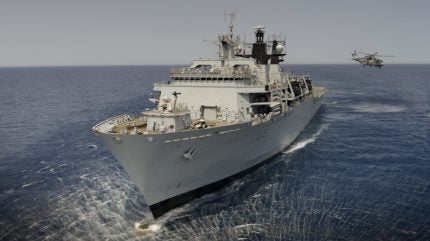
The UK government is looking to sell the recently axed Albion-class amphibious assault ships HMS Albion and HMS Bulwark in an ‘as is’ state in a direct government-to-government deal, although no prospective customers have been named.
Detailed in a parliamentary written response on 14 January 2025, Maria Eagle, UK Minister for Defence Procurement, stated that both vessels were currently “laid up awaiting disposal”, with the Royal Navy said to be “exploring options” for prospective sales.
The vessels were part of wider large-scale cuts to UK defence capabilities in late-2024, which saw drones, helicopters, and warships all axed.
Eagle said both ships required “costly and time-consuming refits” and as such, were “not considered a cost-effective use of taxpayers’ money”.
The sale will save £9m ($11m) a year in maintenance, as well as funds generated from the sale of the two 20,000 tonne warships, Eagle added, stating that any sale would “reinforce relationships” with international partners.
“These vessels had, in effect, been retired by the previous government,” Eagle maintained.
This is incorrect, as both vessels were being kept in a condition known as ‘extended readiness’, able to be worked up into service as required, effectively in reserve. Many countries, including the United States, maintain a reserve fleet able to be brought into service within various timeframes, to accommodate operational necessities such as the outbreak of major conflicts or war.

As specialised warships, the Albion-class amphibious assault ships provided the capability to embark around 400 troops and associated equipment, with its aft flight deck providing landing spots for rotary aircraft up to the size of the heavy lift CH-47 Chinook.
According to the Royal Navy, below deck storage provide capacity for dozens of large trucks and smaller vehicles for light role configuration troops, or a squadron of six Challenger 2 main battle tanks and 30 amoured personnel carriers.
Delivery of troops and vehicles is performed either via the helicopter flight deck or the integrated well deck at the stern, which is floodable to create a dock area. Landing ships, such as the Landing Craft Utility MK10, are hosted inside the Albion class and used ferry tanks, APCs, vehicles, and troops to shore.
The UK government has said that the role of the Albion class will be performed by three smaller, less effective Bay-class landing ship docks operated by the Royal Fleet Auxiliary (RFA), and the 45-year-old casualty receiving ship, RFA Argus.
One of the Bay class, RFA Cardigan Bay, is currently laid up and likely not available for operations until the end of 2026 or early 2027. The Bay class cannot embark as many troops or vehicles as the Albion class and can host only half as many landing ships, while also being manufactured to commercial, not military, standards.
Brazil likely an option for Albion class
The UK has previously had success in selling unwanted naval platforms into South America, with the former Royal Navy helicopter carrier HMS Ocean sold to Brazil in 2018 in a deal worth around £84m at the time. The vessel had served in the Royal Navy for less than 20 years before being decommissioned.
However, HMS Ocean was purchased as a direct replacement for Brazil’s 1960s era aircraft carrier São Paulo, which was originally acquired from France.

The Brazilian Navy also operates the former Royal Navy Type 22 frigate HMS Battleaxe, which was acquired in 1997 and renamed Rademaker.
In 2012, Brazil also acquired three offshore patrol vessels (OPV) from UK shipbuilder BAE Systems in 2012, newly dubbed the Amazonas-class OPVs. The vessels, which were based on the Batch 2 River-class OPVs, were originally manufactured for Trinidad and Tobago in the late 2000s, which subsequently opted not to complete the acquisition.
The UK MoD declined to comment on prospective sale countries for HMS Albion and HMS Bulwark, when contracted by Naval Technology.







